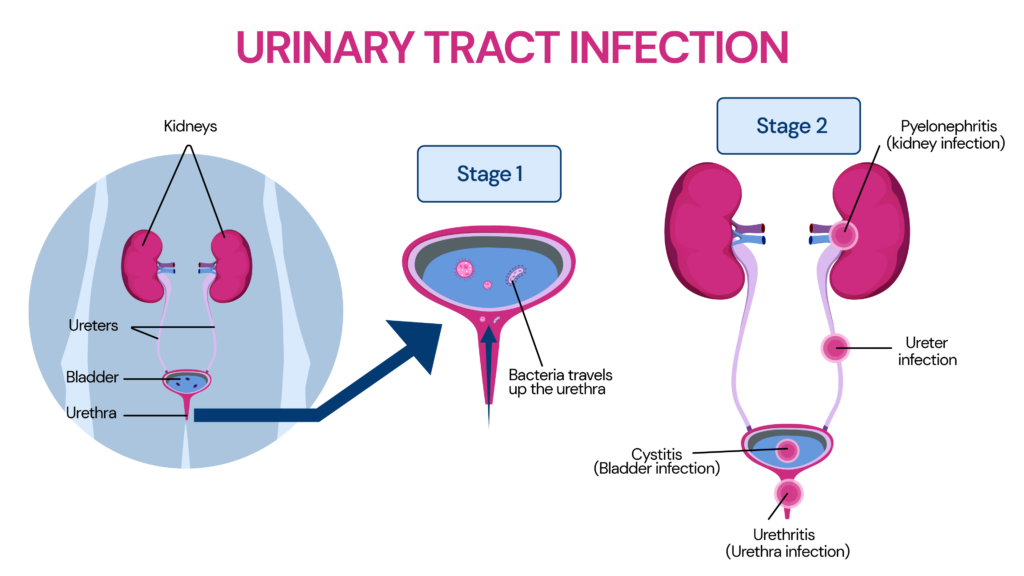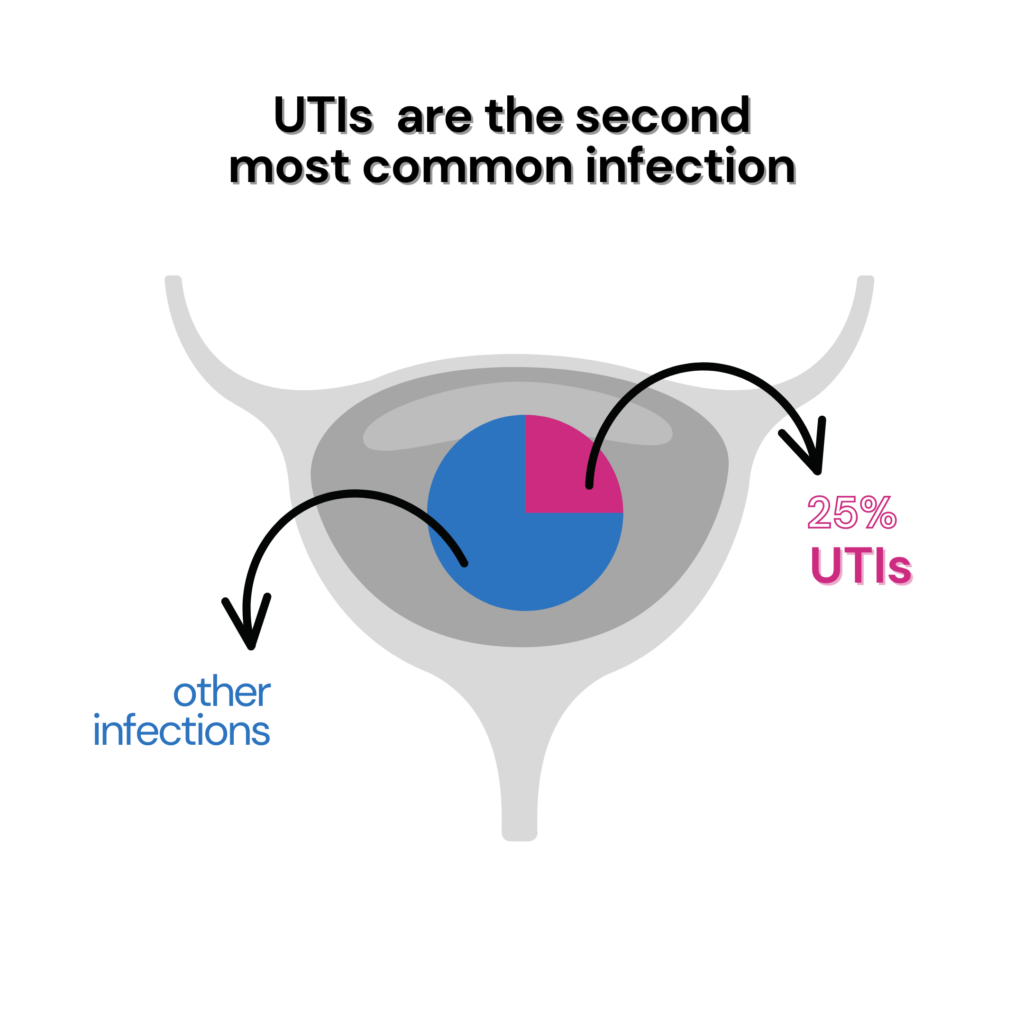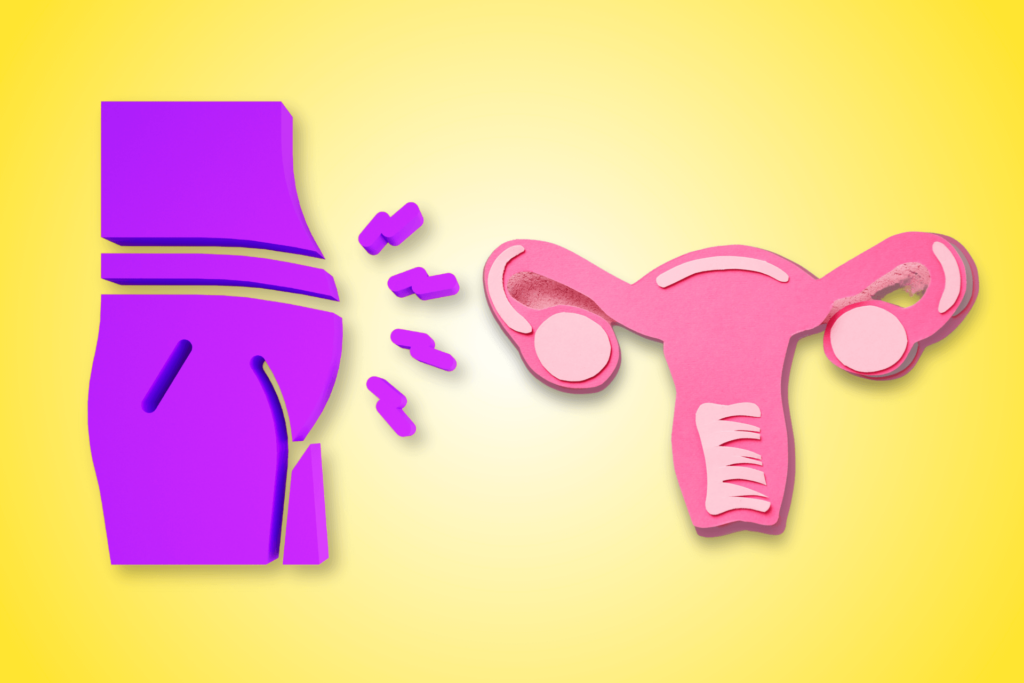Have you ever wondered why some people seem more prone to urinary tract infections (UTIs) than others? While lifestyle factors and hygiene play a significant role, an intriguing question often arises: Are UTIs genetic? In this article, we'll dive into the genetics of UTIs and explore whether your genes could contribute to your susceptibility.
What Are UTIs?
UTIs are common infections that infect the urinary tract.
These infections are caused by bacteria that enter the urethra (the tube that expels urine from the bladder outside) either from the skin or the rectum.
The most common type of UTI is a bladder infection called cystitis. If unchecked, in rare cases, bladder infections can travel upwards to affect the kidney.
Around 60% of females and 12% of males will have experienced at least one episode of UTI during their lifetime.

Symptoms
You may have UTI if you experience one or more of the following symptoms:
- Pain or burning sensation while urinating
- Frequent urination/urge to urinate despite an empty bladder
- Blood in the urine
- Pressure or cramping in the lower abdomen or groin region
- At times, the urine also smells bad and appears cloudy
If the UTI has spread to the kidneys, you may experience the following:
- Fever
- Chills
- Lower back pain
- Nausea and vomiting
*Disclaimer: Please do not self-diagnose UTIs based only on the above information. Visit a qualified medical practitioner for the best course of action.
Are UTIs Genetic?
Yes, genetics is one of the factors that influence the development of UTIs. This risk is influenced predominantly by genes that regulate the immune responses of the host.
Recurrent Infections
According to research, 27% of females experience UTI recurrence within 6 months of the first infection, and 40% of kids who get a UTI develop another one within a year.
The recurrent nature of UTIs may indicate that this condition may have a genetic link with some females prone to them due to their family tree.
Family history
A few studies have reported that females who have recurrent UTIs have a stronger family history of UTIs compared to other females.
Genetic variants
Further research found that some people born with specific cell receptors in their urinary tracts that allow bacteria to stick to them better develop UTIs more often.
A 2010 study on UTIs found that 6 out of 14 genes investigated may be associated with genetic susceptibility to recurrent UTIs in humans.
These studies show that being prone to UTIs may have to do with your genetic makeup and heredity.
The genes implicated control the immune system pathways in the body. Any variations in these genes have also been found to increase your UTI risk.
How’s UTI Inherited?
There is no clear inheritance pattern for UTIs. When there's an affected family member, female relatives of that member tend to have a higher risk.
Can You Catch A UTI From Family?
Though UTIs are not contagious, the bacteria causing this infection can travel from one person to another.
If My Mother Had Frequent UTIs, Will I Also Have UTIs?
Research states that having a mother or sister with recurrent UTIs increases your risk of developing the condition more often.
This has to do with your genes.
Some females inherit cell receptors in the urinary tract from their biological mothers, which allows bacteria to stick better, causing recurrent UTIs.

Other Common Causes and Risk Factors Of UTI
Bacteria live in large numbers around the vagina and the rectum.
When these bacteria enter the urinary tract due to wrong personal hygiene practices, they tend to cause UTIs.
Just like some people are prone to colds and allergies, many are prone to UTIs.
A few factors known to cause and increase the risk of UTIs include:
- Sex at birth: Females are more prone to UTIs than males because they have shorter urethras closer to the rectum. This makes it easier for bacteria to enter the urinary tract.
- Body factors: Some are genetically prone to UTIs because they have shorter urinary tracts, making it easier for the bacteria to cling to them. In those who have attained menopause, the changes in the vaginal lining and loss of protection by the hormone estrogen can increase their risk for UTIs.
- Weakened immunity: Health conditions like diabetes can put people at a higher risk for developing UTIs as their immunity is slightly weakened.
- Sexual intercourse: Having sex disrupts the bacteria around the vagina and may cause them to enter the urinary tract causing UTIs. This may occur in case of alternating oral, vaginal, and anal sexual practices or using unclean sex toys.
Environmental and Lifestyle Factors in UTIs
Genetics does not directly cause UTIs. However, when combined with environmental and lifestyle factors, your genes can influence your risk for UTIs.
- Personal hygiene practices
Several personal hygiene practices can increase your risk for UTIs. For example:
- Wiping from back to front increases the chances of rectal/gut bacteria entering the vagina, triggering a UTI.
- Holding your urine for prolonged periods can increase UTI risk as it can result in bacteria multiplying.
- Douching or using feminine hygiene sprays, powders, or other chemical irritants can disturb the bacteria around the vagina.
- Sexual activity
Sexual intercourse and other associated practices can increase the risk for UTIs.
- Jacuzzis and hot water tubs
Public hot tubs and jacuzzis are the perfect breeding ground for bacteria that cause UTIs.
- Unclean working environment
Working in an unclean environment has been found to cause an increased incidence of UTIs.
UTI Prevention and Management
Preventing UTIs
Whether you are prone to UTIs or just wish to stay clear of these pesky infections, here are a few ways to prevent them:
- Wiping from front to back after a bowel movement is recommended to avoid infections.
- Both males and females must urinate after sexual intercourse to reduce their risk for UTIs.
- If you are prone to UTIs, avoid hot tubs and prefer hot showers.
- Aim to drink at least 2 to 3 liters of water every day.
Keeping yourself hydrated and drinking adequate water helps flush out bacteria in the urinary tract every time you urinate.
Management of UTIs
Though UTIs are nagging infections, they are easy to manage.
Treatment and management of UTIs depend upon the severity of the infection, your symptoms, and the causative organism (that can be detected using a urinary culture).
Antibiotics are usually the first line of treatment for UTIs.
Following healthy personal hygiene practices and staying hydrated can also help alleviate the symptoms and reduce the recurrence of UTIs.
Summary: Are UTIs Genetic?
- Urinary Tract Infections (UTIs) are common infections that infect the urinary tract and are more common among females.
- While UTIs can affect any part of the urinary tract, the most common type is a bladder infection called cystitis.
- Common symptoms of UTIs include burning during urination, frequent urination and urge to urinate, presence of blood in the urine, and abdominal cramping.
- Anatomical differences between males and females, genetics, lifestyle factors, and genetics influence your risk for UTIs.
- Several studies have shown that UTIs are more common among female relatives of females with recurrent UTIs, indicating the influence of genetic factors.
- Though UTIs are not contagious, the UTI-causing bacteria can travel from one individual to the next.
- Wiping from front to back after a bowel movement, avoiding douching, staying hydrated, and urinating after sex can prevent UTIs.
Expert Picks For You

Exploring the Relationship Between Menstrual Cycle and Sleep

Is Spearmint Tea Actually Effective For PCOS?

Bloating During Ovulation: What Could It Mean?
References
- https://emedicine.medscape.com/article/233101-overview
- https://www.ncbi.nlm.nih.gov/pmc/articles/PMC4286230/
- https://www.utivahealth.com/blogs/resources/like-mother-like-daughter-is-being-prone-to-utis-hereditary
- https://cathaydrug.com/genetics-play-role-womens-recurrent-uti/
- https://www.sciencedaily.com/releases/2007/09/070904214408.htm
- https://www.uristat.com/about-uti/4-reasons-why-you-might-get-recurring-utis
- https://www.mayoclinic.org/diseases-conditions/urinary-tract-infection/diagnosis-treatment/drc-20353453
- https://www.cdc.gov/antibiotic-use/uti.html
- https://www.health.harvard.edu/bladder-and-bowel/when-urinary-tract-infections-keep-coming-back
- https://www.verywellhealth.com/urinary-tract-infections-causes-and-risk-factors-4161060#toc-lifestyle-risk-factors




